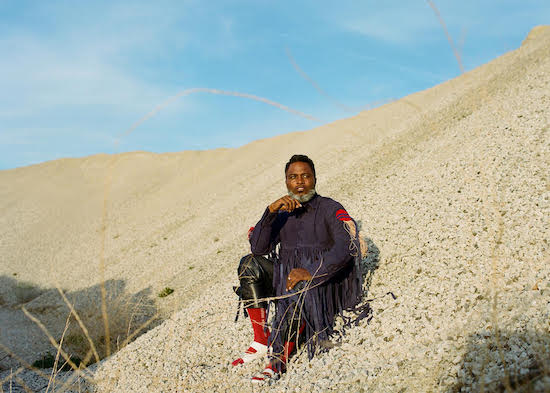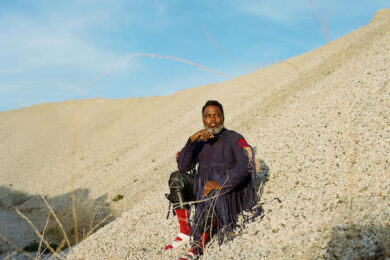I’m staring at the album cover for The Don Of Diamond Dreams looking for clues. At first glance, it looks like it could be a poster for a Blaxploitation flick shot by one of Sun Ra’s disciples. Ishmael Butler, vocalist and one half of the duo, is in the centre adorned in a gold cape and aviator sunglasses, a gold cobra curling round to his right. Is that Arabic script in the background? Or Amharic? It’s impossible to tell.
I consider geographical clues. There are two skits on the album entitled ‘Portal North: Panthera’ and, halfway through, ‘Portal South: Micah’. Are these coordinates from an alternative cartography, points on a mystical map? Every time I listen to a Shabazz Palaces album, it begins in the same way, with the futile search for narrative breadcrumbs that might help decipher the cryptic messages and sonic red herrings. In interviews, Butler has talked about how the internet has replaced our own innate telepathic abilities: “Instead of being able to think along wavelengths and connect that way, we’ve made devices that do it for us.” Ultimately, tapping into their music intuitively – and submitting to its own subversive logic – is the only way to fully enjoy it.
And it’s always an enjoyable ride.
Now on their fourth studio album, the Seattle duo – made up of Butler and Tende ‘Baba’ Maraire – have been lurking at the edges of alternative hip hop for over a decade. During that time they’ve revelled in ambiguity, but they’ve also built a soundworld that is utterly unique, strange and compelling. Three years on from 2017’s Quazarz albums, this offering is a little more approachable. While Quazarz: Born On A Gangster Star and Quazarz vs The Jealous Machines were conceptually and sonically ambitious, they were also murky and disorienting, a reflection of the dire political circumstances (such as the inauguration of Trump), that were taking place during their production. The Don of Diamond Dreams, meanwhile, feels warmer and more optimistic.
While Shabazz Palaces have in the past resisted attempts to label them as part of an Afrofuturist continuum, this album does feel as though it has emerged from an alternate timeline, borrowing and toying with various genres – p-funk, jazz and trap among them – without being fully beholden to any of them. Take the opener, ‘Ad Ventures’. It’s a gorgeous, playful track that feels like it’s been beamed down from a flying saucer. Its narrator is someone for whom “moonlight is my guide”, who also knows “the secrets of the Earth”, yet is imagining all of this while “singing on the night shift”. It’s a fable of both the mundane and the extraordinary, set to perky bass arpeggios and snare rolls. ‘Wet’ is equally peculiar and oddly haunting: a shuffling beat met by a woozy bass line, over which Butler sings “I just like the water cos it’s wet”. As on many of their tracks, the beats are so minimal that the tracks feel barely tethered to anything. But in fact the opposite is true: the scope of the album is vast, part dreamscape, part soundtrack to an imaginary voyage.
The album comes into its full, glorious weirdness on ‘Chocolate Souffle’. The lyrics speak of being “born in a golden forest” while “five Nigerian space-queens sing my chorus”. Its bass line could have easily been lifted from a 70s George Clinton epic, yet its concerns are very much of the modern day. A repeating lyric is “my phone’s really not that smart”, and there are hints of a rejection of the shiny but superficial culture engendered by social media (“you’re a scroller / I’m an explorer”). The 10 tracks on the album touch on many genre signifiers, but these are always warped into something unexpected. The booming kick drum and rattling hi-hats of ‘Money Yoga’, for example, sound like they belong to a trap tune, yet the spacey synth line doesn’t at all. Indeed, they seem to be toying with the genre, taking the autotuned vocals that have become a cliche, and ramping them up to camp, almost ridiculous effect: guest vocalist Darrius sings “all I think about is money”, while a saxophone warbles in the background.
The album opens and ends with a heavily distorted voice intoning: “be inside your mind / paint a picture”. This, in essence, is what distinguishes the album from the slightly gloomier (though no less interesting) material on the two Quazarz LPs. While there was a sense of dismay running through those at a reality that was beginning to fracture, The Don Of Diamond Dreams feels imbued with a sense that alternative realities – different ways of telling stories, different mythologies to reflect our true nature – are always within our reach, if only we’re able to fully embrace our own imaginations.



